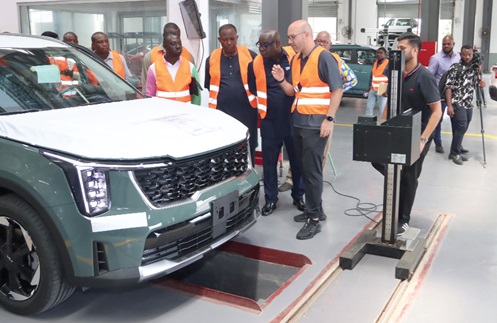The Chief Operations Officer of Rana Motors, Kassem M. Odaymat, has urged the government to expedite the implementation of the Ghana Automotive Development Policy (GADP), stating that several pending policy measures were stalling growth and job creation in the sector.
According to him, although the policy was passed nearly four years ago, key aspects remained unimplemented — a situation, he said, continued to constrain the plant’s production capacity and ability to expand local employment, especially among young engineers.
Launched in 2019, the GADP is a government initiative aimed at transforming the country into a regional hub for automotive manufacturing in West Africa.
It was developed by the Ministry of Trade and Industry in collaboration with stakeholders, including international carmakers, local assemblers and regulators.
“Today, we are operating at just a fraction of our full capacity.
We could easily multiply our output and workforce if the policy were fully implemented,” Mr Odaymat said.
He made the call when the Parliamentary Select Committee on Trade, Industry and Tourism paid a working visit to the Rana Motors Assembly Plant in Accra today (May 7).
The visit was part of the committee’s duty to go round the industrial zones to identify performing companies, get their operations and also find out what their challenges are.
Ban enforcement
Mr Odaymat, who's also the President of the Ghana Automobile Distributors Association, also called for the enforcement of a ban on the importation of used vehicles older than 10 years, the implementation of a 35 per cent import duty on used vehicles aged between one and five years and the application of the Ghana Standards Authority’s homologation standards to all imported vehicles.
He explained that those steps were crucial to creating a level playing field for local assemblers, who were investing in training, infrastructure and modern assembly lines.
“Without these measures, used vehicles continue to flood the market, directly competing with brand new vehicles assembled in Ghana,” he noted.
According to Mr Odaymat, assemblers in the country had already made concessions by agreeing that vehicles between five and 10 years old could continue under the current duty regime to ease pressure on consumers, but stressed that at least the 35 per cent duty should apply to cars under five years old.
He also pointed out inconsistencies in the enforcement of homologation, which certified that vehicles met local technical and safety standards.
“We, the new vehicle assemblers, are bearing the cost of homologation, yet many imported used vehicles are not being subjected to the same standards,” he said, calling the situation unfair and counterproductive to the policy’s goals.
Long-term plans
Touching on the company’s long-term plans, the chief operations officer said Rana Motors had designed its facility to meet all phases of assembly, from Semi Knocked Down (SKD) to Complete Knocked Down (CKD).
He, however, stressed that moving up the value chain required building capacity and increasing production volumes.
He also disclosed that the company had the infrastructure to scale production from 35,000 units annually to 75,000, should the market conditions improve and policy issues be resolved.
He emphasised the potential of component manufacturing as the next frontier, noting that such operations could employ 10 to 20 times more people than vehicle assembly itself.
“Component manufacturing investors need assurance of volume, and that comes from a fully functioning and enforced policy,” he said.
Commendation
The Chairperson of the committee, Hottordze Roosevelt Alexander, commended Rana Motors for its high local content and contribution to job creation.
He also praised its operations, noting that most of the staff, including engineers and managers, were Ghanaians.
“Our dream is to make sure that every Ghanaian youth, regardless of background, gets something to do.
Now that we have a company employing our people like this, we are very happy,” he said.
He gave an assurance that the committee had taken note of the challenges raised and would engage relevant authorities to address them.

